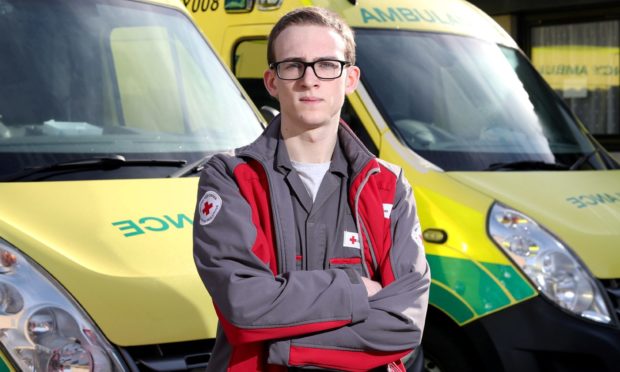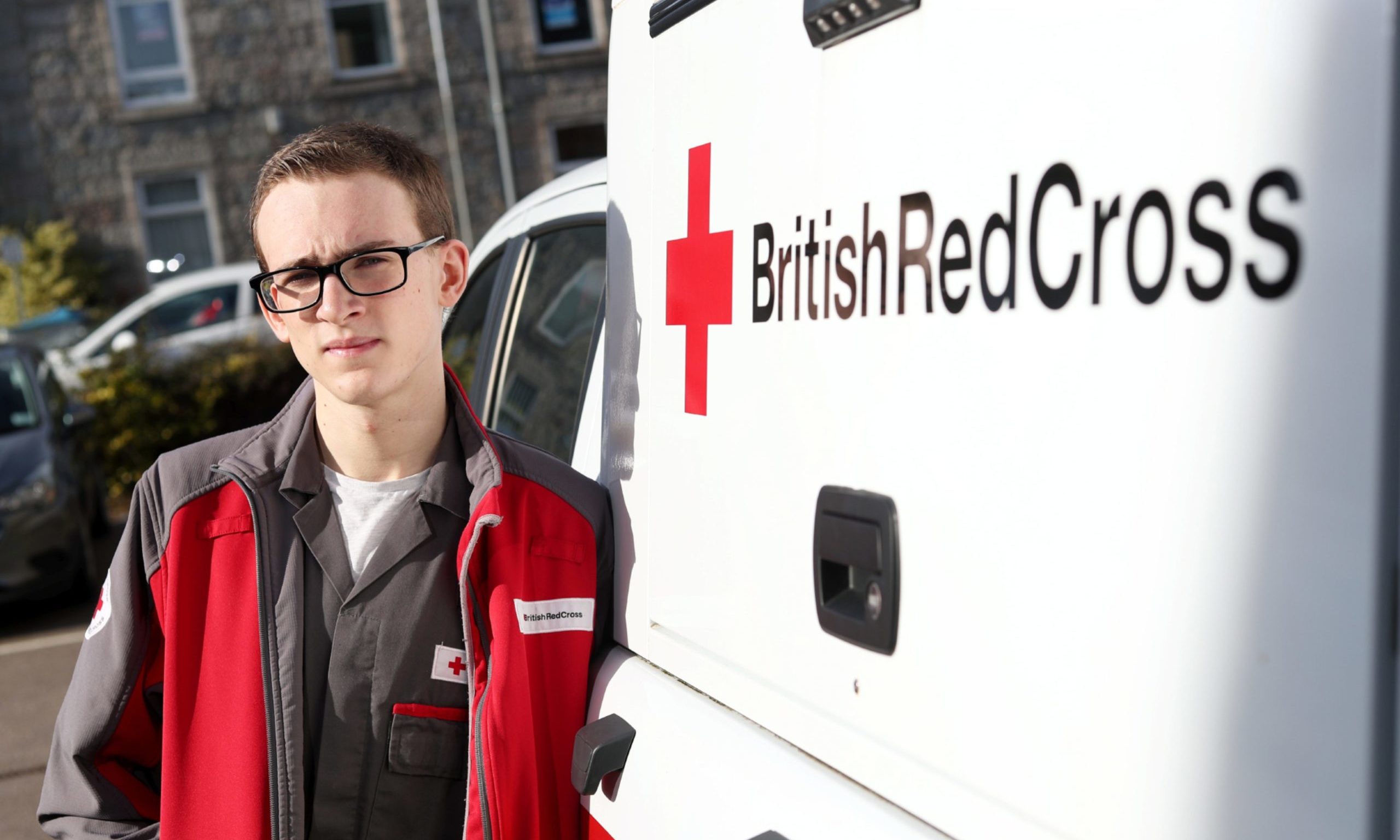When Calum Leitch’s family home flooded in January 2016, the British Red Cross was there to help.
And on that day, after being helped to dry land, the Inverurie teenager realised he wanted to give back and support others.
Mr Leitch, now 18, said: “It was the middle of the night and the weather was just horrible.
“There was about six feet of water on the roads and it was snowing, it was freezing cold.
“But the Red Cross was there to talk to you and be there for you.
“They directly supported me, because it was them that took me from where I was to the evacuation centre about two miles away.
“That was my first interaction with the Red Cross and I found it quite inspiring, especially knowing these people were volunteers.
“It was very stressful but it was nice to know there was somebody there to have that kindness and just to speak to you.”
‘Unique experience’ of volunteering
As soon as he was able to, Mr Leitch signed up as a Red Cross volunteer.
The 16-year-old provided first aid at events until the service closed in March last year, when he moved over to ambulance support.
He now spends his weekends helping to transport patients to and from hospital across the north-east.
“It’s such a unique experience,” he said, “but I’ve really been enjoying giving back to the community.
“And it has been quite nerve-wracking at times.
“You’re dealing with people at a point when they’re in crisis. For these people, it’s one of the worst days of their life.
“With patient transport work, it’s not necessarily the most acute stuff but some of the people can need quite intensive support.
“They put a lot of trust in you to get them where they need to go.”
The Red Cross helps to move patients between hospitals, and take them from the wards back home.
It also supports the ambulance service more directly, intervening if a GP says a patient must be taken to hospital or attending 999 calls at peak times.
Red Cross work is ‘extremely rewarding’
Mr Leitch said: “It’s extremely rewarding when you turn up at a patient’s house and they’ve been waiting hours for an ambulance.
“Or you turn up at a ward to take a patient home and they cry because no-one else has been available to take them.
“It’s such a rewarding experience to know these patients are directly benefiting from your support.
“Some of the patients we can see can be really unwell, and it can be quite an upsetting time – especially when there’s nothing more you can do for them.
“You’re seeing someone at the end of their life, but you know what you’re doing is helping them.”
Some patients have been left surprised by how young Mr Leitch is, as he helps them on their journey – “often” being asked how old he is.
He also recalled one interaction which he found especially heart-warming.
“I had a patient with dementia who wasn’t very aware of where she was or who I was,” he said.
“She thought she was on a train and was very scared while we were transferring her.
“All of a sudden out of nowhere she almost seemed to snap out of it and have a moment of clarity.
“She held my hand, looked me dead in the eye and said ‘you are kindness’, then she went back to being unsure of her surroundings.
“I found that particularly moving.”
New perspective
Mr Leitch had initially applied to study medicine at university but his work with the Red Cross has shifted his perspective.
He said: “It’s given me a different viewpoint on things because now I’ve applied for paramedic science at university instead.
“Through this voluntary work, I’ve decided medicine isn’t for me.
“I really enjoy the moving about, not being based in one place all the time, and not having that immediate support if something does go wrong.
“If you work in a hospital, you’ve always got people around you that can help. Whereas if you’re on an ambulance, there’s another person on the ambulance and if anything goes wrong, it’s up to you to try and solve it.”
Increased confidence
Even looking back just 12 months, Mr Leitch says his confidence levels “weren’t even half” what they are now.
He has attributed the boost solely to his work with the Red Cross.
“It’s been really useful and has really developed my interpersonal skills and communication,” he said.
“A year ago I would never have been able to sit in the back of an ambulance and speak to someone for a 50-60 mile journey – especially if I didn’t know them.
“But now I’ve also got more confidence when treating patients. I’ve been able to explain to them what’s going on and have a calming effect on them.”
He added: “Given how rewarding volunteering is, and because there are so many organisations out there, there’s definitely a role for everyone.
“For school leavers in particular I’d definitely recommend taking a year out to find themselves and what they enjoy – and you can do that through volunteering.
“And there are so many skills you can get from the Red Cross, not so much in a clinical capacity, but the skills that it teaches you in terms of confidence and speaking to people.”
The act of helping others has also been a large positive of Mr Leitch’s role.
“There have been people we’ve supported that have been quite vulnerable,” he said.
“It does take me back to being in a similar position myself.
“I know what that feels like to have the support from a stranger.”
Youngster appeared in P&J after needing an ambulance himself
In 2012, Mr Leitch found himself in the pages of The Press and Journal for the first time.
At 10 years old, he spent two days in hospital with a broken leg after being knocked down while trying to cross the road in Port Elphinstone.
And had it not been for the toy riot helmet he was wearing at the time, his injuries could have been much worse.
With it blocking out sound and obscuring his vision, the youngster was left unaware of the car quickly approaching him.
After arriving at the scene, police found the helmet so realistic they initially thought it was real.
During his recovery, while he still required crutches to get about, he was invited to see members of Grampian Police taking part in a riot demonstration.
At the time, the force’s road safety adviser Karen Megany said: “It’s ironic that the one thing that contributed to what happened also saved him. It’s been a hard lesson.
“If anything good at all can come out of this it is to be more careful, find a safe place to cross and give the road 101% of your concentration.”

